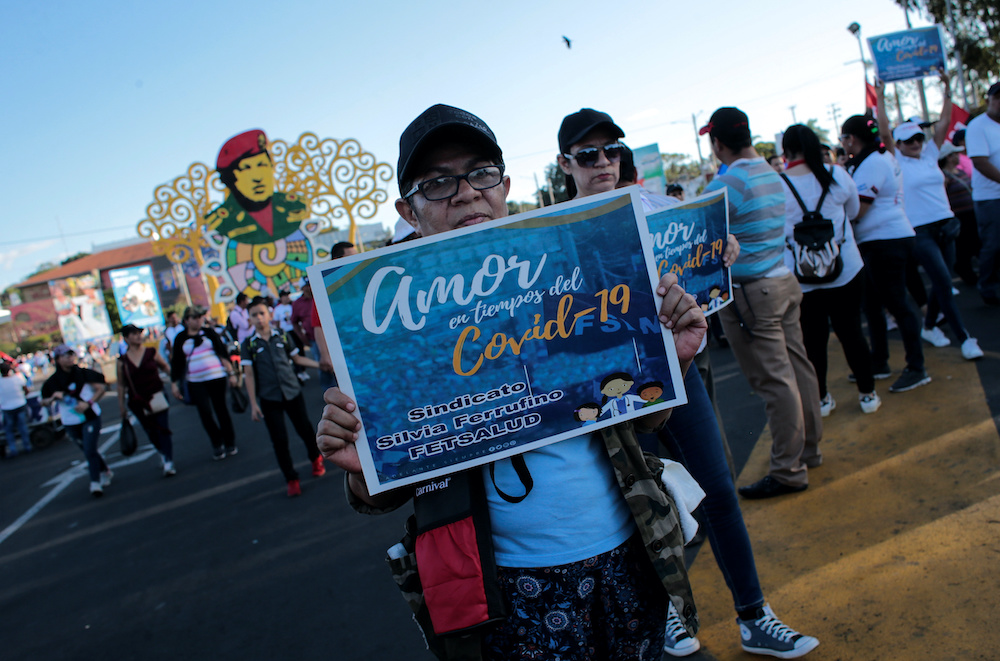Translated by Dick Cluster. Leer en español.
On March 12, the weekly Confidencial (“Confidential”) revealed the contents of a Protocol for Coronavirus Response produced by Nicaragua’s Ministry of Health that described some of the internal measures taken by the government to respond to the COVID-19 pandemic.
This official protocol, which had until then remained secret, projects that over six months the coronavirus will infect 32,500 people and cause 813 deaths. However, in spite of this estimate (considered very conservative by independent epidemiologists), the Ministry of Health has not designed a prevention strategy based on public information campaigns or other measures to limit the spread of the virus.
While the nearby countries of El Salvador, Costa Rica, and Honduras quickly adopted physical distancing measures like canceling classes, closing borders, and instituting quarantines to prevent the spread of the virus, the attitude of the highest authorities in Nicaragua has been one of denial and secrecy, prioritizing the leaders’ infatuation with power over the citizens’ right to health and life.
In spite of the World Health Organization on March 11 declaring the coronavirus outbreak a pandemic, on Saturday, March 14, Vice President Rosario Murillo convened a massive demonstration by the pro-government party and public employees in Managua, financed with state funds. This was a mixture of parade and carnival under the title of “Love in the Times of COVID-19,” attended by tens of thousands of people while the special envoy of the Pan-American Health Organization maintained an eloquent silence.
On March 18, the government announced the first confirmed case of coronavirus, followed on March 20 by news of the second such case (both “imported”). The following week the government announced 14 “suspicious” cases under observation, but no one knows for sure how many tests for the virus have been performed in Nicaragua, how many confirmed cases exist, the true condition of the patients, or the overall level of the spread of the pandemic within the country — all because of the government’s policies of secrecy.
Since Daniel Ortega returned to power in 2007, he has instituted an authoritarian policy of zero transparency, guided by the eagerness of his wife, the current vice president, to impose her strategy of “uncontaminated information,” which means the enshrinement of an official truth exempt from the counterweight of the press or uncomfortable questions posed by independent journalists. In a time of coronavirus pandemic, control over public information has become even more centralized. The vice president, who acts as state spokesperson, maintains her routine of reading a daily monologue over the official radio and television. The independent media and international press are barred from Ministry of Health press conferences; the only permitted attendees are representatives of the official state media and of the presidential family’s private consortium.
On March 26, the government announced the first death of a Nicaraguan citizen infected by the coronavirus, and the next day revealed two more positive cases. By this time, it had wasted 16 valuable days during which it could have informed the population and adopted preventive measures. Instead, it irresponsibly promoted actions that tended to favor the spread of the virus among thousands of people.
The news of the first death provoked an automatic tendency toward suspension of activities in the commercial sector, private schools, and many businesses, including informal commerce. But the vice president continued encouraging government activities, the holding of festivals, assemblies, and tourist events, and plans for Holy Week vacations, as well as ordering thousands of house-by-house visits by public employees, all of which promote greater contact among the population.
The irrationality of a regime that refuses to declare a coronavirus emergency has generated a range of opinions about possible ulterior motives. Some refer to the mental health of the top officials, as if this could mitigate their commission of state crimes. Others suggest motives involving political and economic calculations — that the president wants to avoid, at all costs, any negative effect on the country’s supposed economic stability. The priority of this regime that calls itself “Christian, socialist, and based on solidarity” does not seem to be attending to human beings, nor even the economy, but simply collecting the taxes that keep the public budget afloat so as to meet the payroll of repression. After the civic protests that began in April 2018 were brutally repressed, leaving more than 300 murders uncharged and unprosecuted, the Ortega dictatorship imposed a de facto police state that keeps more than 60 political prisoners behind bars and has abrogated the rights to assembly, mobilization, and freedom of the press and of expression. Well before the arrival of the coronavirus, Nicaragua had already lived through two consecutive years of economic recession.
What will the course of the coronavirus bring over the next 15 or 30 days? That question is impossible to answer. In contrast to the government’s inaction, a large citizens’ crusade to defeat secrecy and prevent the spread of the virus has arisen. This campaign has support from doctors and epidemiologists, independent media, business associations, schools and colleges, families and communities, and both Catholic and evangelical churches.
Civil society has given rise to a voluntary quarantine to confront the pandemic. Meanwhile, the offices of Confidencial and Esta Semana (“This Week”), the independent media that I have led for more than two decades, are still under illegal occupation by the police, which began December 14, 2018, while our journalists continue to report the truth. We are working remotely and distributing our content, via the internet and the social networks YouTube and Facebook, to challenge the censorship of the dictatorship allied with the coronavirus.
On March 12, the weekly Confidencial (“Confidential”) revealed the contents of a Protocol for Coronavirus Response produced by Nicaragua’s Ministry of Health that described some of the internal measures taken by the government to respond to the COVID-19 pandemic.
This official protocol, which had until then remained secret, projects that over six months the coronavirus will infect 32,500 people and cause 813 deaths. However, in spite of this estimate (considered very conservative by independent epidemiologists), the Ministry of Health has not designed a prevention strategy based on public information campaigns or other measures to limit the spread of the virus.
While the nearby countries of El Salvador, Costa Rica, and Honduras quickly adopted physical distancing measures like canceling classes, closing borders, and instituting quarantines to prevent the spread of the virus, the attitude of the highest authorities in Nicaragua has been one of denial and secrecy, prioritizing the leaders’ infatuation with power over the citizens’ right to health and life.
In spite of the World Health Organization on March 11 declaring the coronavirus outbreak a pandemic, on Saturday, March 14, Vice President Rosario Murillo convened a massive demonstration by the pro-government party and public employees in Managua, financed with state funds. This was a mixture of parade and carnival under the title of “Love in the Times of COVID-19,” attended by tens of thousands of people while the special envoy of the Pan-American Health Organization maintained an eloquent silence.
On March 18, the government announced the first confirmed case of coronavirus, followed on March 20 by news of the second such case (both “imported”). The following week the government announced 14 “suspicious” cases under observation, but no one knows for sure how many tests for the virus have been performed in Nicaragua, how many confirmed cases exist, the true condition of the patients, or the overall level of the spread of the pandemic within the country — all because of the government’s policies of secrecy.
Since Daniel Ortega returned to power in 2007, he has instituted an authoritarian policy of zero transparency, guided by the eagerness of his wife, the current vice president, to impose her strategy of “uncontaminated information,” which means the enshrinement of an official truth exempt from the counterweight of the press or uncomfortable questions posed by independent journalists. In a time of coronavirus pandemic, control over public information has become even more centralized. The vice president, who acts as state spokesperson, maintains her routine of reading a daily monologue over the official radio and television. The independent media and international press are barred from Ministry of Health press conferences; the only permitted attendees are representatives of the official state media and of the presidential family’s private consortium.
On March 26, the government announced the first death of a Nicaraguan citizen infected by the coronavirus, and the next day revealed two more positive cases. By this time, it had wasted 16 valuable days during which it could have informed the population and adopted preventive measures. Instead, it irresponsibly promoted actions that tended to favor the spread of the virus among thousands of people.
The news of the first death provoked an automatic tendency toward suspension of activities in the commercial sector, private schools, and many businesses, including informal commerce. But the vice president continued encouraging government activities, the holding of festivals, assemblies, and tourist events, and plans for Holy Week vacations, as well as ordering thousands of house-by-house visits by public employees, all of which promote greater contact among the population.
The irrationality of a regime that refuses to declare a coronavirus emergency has generated a range of opinions about possible ulterior motives. Some refer to the mental health of the top officials, as if this could mitigate their commission of state crimes. Others suggest motives involving political and economic calculations — that the president wants to avoid, at all costs, any negative effect on the country’s supposed economic stability. The priority of this regime that calls itself “Christian, socialist, and based on solidarity” does not seem to be attending to human beings, nor even the economy, but simply collecting the taxes that keep the public budget afloat so as to meet the payroll of repression. After the civic protests that began in April 2018 were brutally repressed, leaving more than 300 murders uncharged and unprosecuted, the Ortega dictatorship imposed a de facto police state that keeps more than 60 political prisoners behind bars and has abrogated the rights to assembly, mobilization, and freedom of the press and of expression. Well before the arrival of the coronavirus, Nicaragua had already lived through two consecutive years of economic recession.
What will the course of the coronavirus bring over the next 15 or 30 days? That question is impossible to answer. In contrast to the government’s inaction, a large citizens’ crusade to defeat secrecy and prevent the spread of the virus has arisen. This campaign has support from doctors and epidemiologists, independent media, business associations, schools and colleges, families and communities, and both Catholic and evangelical churches.
Civil society has given rise to a voluntary quarantine to confront the pandemic. Meanwhile, the offices of Confidencial and Esta Semana (“This Week”), the independent media that I have led for more than two decades, are still under illegal occupation by the police, which began December 14, 2018, while our journalists continue to report the truth. We are working remotely and distributing our content, via the internet and the social networks YouTube and Facebook, to challenge the censorship of the dictatorship allied with the coronavirus.



